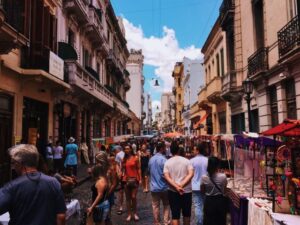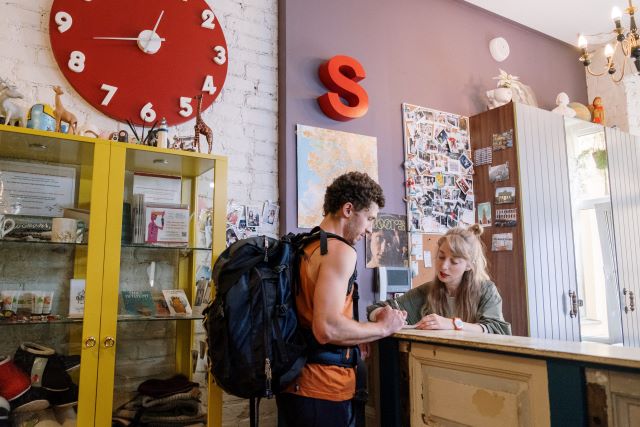If you want to learn a language for tourist travel and other short travel escapades, you will quickly find it is much different from learning a language as a long-term skill. You will have different needs on these short travel escapades compared to longer-term language learning commitments. This post will discuss some of these differences and what you may need to remember when learning a language for a travel escapade. It will also suggest some possible things you can do to help with your learning.

What To Learn For A Tourist Travel Escapade
Let’s imagine that you’re learning a new language, but you’re only doing it because you’ll be travelling to the country as part of a holiday or similar short-stay trip. You want to learn some of the language, but you don’t need to learn all the nitty-gritty just to order a coffee and ask where the nearest ATM is. Of course what you will want to learn may depend on what you are more interested in, or what you think you may want to ask the locals.
Some things you may want to be able to ask in your target language include some of the below. This list is not exhaustive, but will hopefully give you an idea of things you may want to ask. Keep in mind, if you’re thinking of asking these questions, you’ll also need to know some of the keywords for the answer to them as well. For example, it would be helpful to know words for directions, to get the gist of the answer for quite a few of the suggestions below:
- Where is the nearest ATM?
- Can you recommend a good local restaurant?
- How do I get to [popular tourist attraction] from here?
- What’s the best way to travel around the city?
- Do you have a map of the area?
- What’s the local currency and exchange rate?
- Where can I buy a local SIM card?
- How much does a taxi to [destination] cost?
- Is there a pharmacy nearby?
- What time does [museum/shop/attraction] open/close?
- Can you help me with the public transportation system?
- What’s the Wi-Fi password here?
- Are there any local customs I should be aware of?
- Where is the nearest hospital or medical center?
- Can you recommend any must-see places in the city?
- How do I say [basic phrases] in the local language?
- Where can I find a tourist information center?
- Is tap water safe to drink here?
- Are there any local events or festivals happening this week?
- Can you suggest a safe and reliable taxi service?
In order to maximise your time and energy in learning these phrases, it may be useful to first consider what the most spoken language is in the world. This may help inform what phrases you learn, or even if you decide to learn phrases from multiple languages.

Why You Should Learn Phrases
Depending on the level of commitment you have for learning a language, or the number of languages you want to dabble in, there are a variety of ways to go about learning the language(s). There are a lot of languages in the world, and learning them can be time-consuming and difficult.
The easiest way would be to rote learn the phrases you need. This is a straightforward style of learning but has its downsides. Instead of learning why phrases work as they do, you are learning to only say the phrases. Strictly speaking, this is a poor way to learn, because you are not learning to be creative with the language so much as you are learning to say words in another language.
One of the benefits of rote learning is that you learn exactly what you need, and can get very specific about it. There’s no point learning too much grammar or extra words. You also probably won’t need to know much about the future or past tense, as well as the subjective mood particularly if you’re wanting to say specific phrases while travelling in these countries.
To be clear, this type of learning is recommended only for this one reason. Any other reason for learning a language should be accomplished by learning the language so you can creatively combine words in unique ways, to have authentic communication.
To make this kind of rote learning simple, you can learn the sounds of the phrase using flashcards, rather than individual distinctive words.
For example, instead of learning the phrase “Do you have a map of the area?” (Haben Sie eine Karte der Gegend?) in German, you could learn it as sounds. If you were using flashcards for this, it might look something like the following: Front – Do you have a map of the area? Back – Harben Zee eine Karte der Ger-gend?
This has the benefit of making it easier for you to learn but has the downside of moving yourself one step away from the language itself. You also have the benefit of only learning the speaking and listening parts of language rather than reading and writing. This will also help speed things up for you as you learn.
If you want to learn the language to use beyond a short tourist escapade, I recommend learning the language the traditional way.
One additional method of learning that may be helpful for you as a tourist would be to consider playing around with conversational AI as a method to practice phrases which could be done both with audio and vocal methods.

The Best App For Learning Phrases
Essentially what you are doing is memorising phrases to say at specific times. This means you do not need to write or read them, and you possibly won’t even need to recognise those phrases when someone else says them.
Anki is your best bet for learning phrases. This is a flashcard app that allows you to create your own cards. There are also add-ons that you can get, such as Awesome TTS (Text to speech) which will enable audio for the cards you have created. This means you’ll be hearing what you need to say and be able to match this with the phrases you want to learn.
Because Anki is free online and on Android, it is a really good start for learning languages. It can also be used on your phone in offline mode, so you can practice as you travel. Furthermore, as you get better at some phrases, they will become less and less frequent in your deck, while the more difficult-to-learn phrases will continue to appear to help strengthen the weak areas.
All in all, this is your best friend when learning a new language. There is more information available in the following post if you want to learn more about how to use Anki for language learning. Click on the following link to find out more information on what Anki is and does before you dive in.

Speak The Language When You Travel
It’s really easy to practice a foreign language and do all of the things that you feel you need to do to be prepared, but when you arrive in the country…you switch back to English. It’s easier and you know that you are saying what you really want to say. This temptation becomes even stronger when the locals speak better English than you can in their language. Don’t be tempted to change to English. Continue in the target language, even if it is a few phrases.
Even if you are not sure about the pronunciation of these words, I recommend that you give it a shot when you are in that country. The reason for this is that native speakers are more likely to be impressed that you are trying to speak their language than worried if you miss pronouncing some words.
If somebody came to me in the city with an obvious non-Australian accent trying to ask me a question, my first thought would be to be impressed that they are attempting to speak English. If the only words I could understand were “Where” and “train”, it would be fairly obvious what they were asking, even if they pronounced it wrong.
Even just learning a few phrases can go a long way toward creating connections with the people in the places you are travelling to. This becomes more and more important as you go to less and less populous destinations, as these places also have smaller chances of having English speakers.
There is nothing worse than having tourists arrive at your hometown expecting that the locals speak English, rather than trying to speak the language of the area. You are in their territory so showing that you have acknowledged that by attempting to learn a few words can go a long way towards having a better time there.

A Useful Tip For Travelling To Another Country
If you are worried about pronunciation, one thing you could do is download a Translate app on your phone. With this app, you could have it ‘speak’ your sentence for you, knowing that what it is saying is what you have typed into it.
While this is somewhat ‘cheating’ in terms of speaking in a foreign language, it can help make you feel a bit more secure, knowing that even if you were to say something wrong, you can always pull out the app to say it correctly.
Some of these apps can be used in offline mode if you won’t be purchasing a SIM card while you’re travelling. If this is the case, I also recommend having a paper map, so that if you ever get lost, you can ask a local where you are.

Learning The Customs Of The Places You Travel To
Alongside learning the words of the language(s) of the places you will be travelling, it is also important to make sure that you have learned about the customs and traditions of that place. This can include simple things such as knowing etiquette at shops and restaurants, as well as more detailed things such as reading public transport timetables and understanding their ticketing system.
This is something that you can most easily pick up from travel books, which usually have sections about local customs and traditions. You can also do it through some quick Google searches as well. Although you probably won’t need to memorize these, they are certainly good to know and might be helpful when you are travelling in the country to look a little bit less like a tourist. Every little detail counts!
Keep in mind, that you are essentially learning the culture of a new group of people. While you probably don’t need to go as deeply into this as you might if you were learning the language to speak like a native, there are certainly benefits to learning cultural elements of the language.

In Conclusion
The two apps that I would recommend for learning the phrases necessary would be Anki, for creating flashcards to practice your phrases and some sort of translated app to be used while you are travelling. Because you are not necessarily learning the full language, apps such as Duolingo will be less useful for you.
Of course, I hope that you return from your travels and decide that you do want to proceed with learning more of the language. If that does become the case you can learn more about learning languages through out this website.
There is information on learning at home, as well as using language tutors. If you are more seasoned, you may wonder if there is any benefit to starting to learn a language, but I assure you it is.
If you travel and decide that you desire to learn the language further, please consider doing this! You are never too old to learn a language, and transitioning from learning phrases for travel into learning the language to speak like a native, or to increase your connection with the locals is easy to do!
- Should Everyone In The World Speak A Universal Language?

- The Power of Immersing Yourself In A Language For Learning

- Start Your Language Learning Journey: Duolingo And Other Methods

- Does Learning A Language Help You Learn How Others Think

- Can You Learn a Language Without Learning Its Culture?

- Unlock Fluent Expression: Sentence Builders Across Languages

- Hidden Gems: Underrated Duolingo Languages Worth Learning

- The Ultimate German Pronunciation Guide

- Where To After Finishing Duolingo For Language Learning










